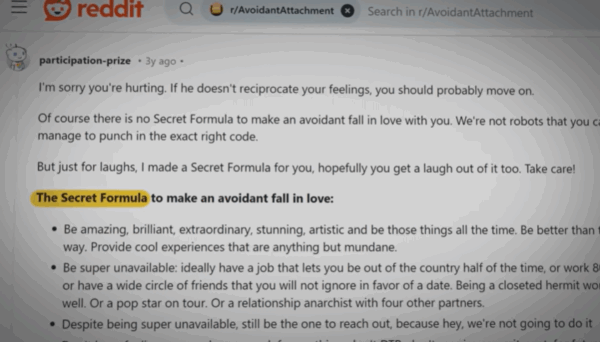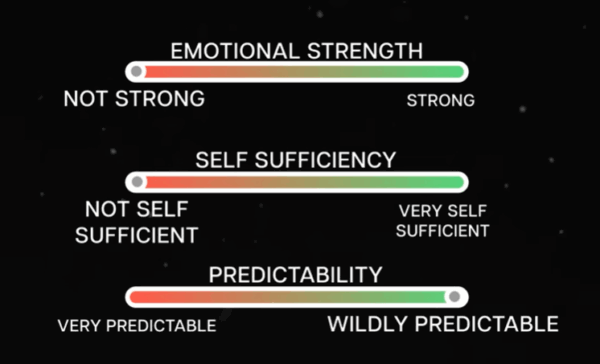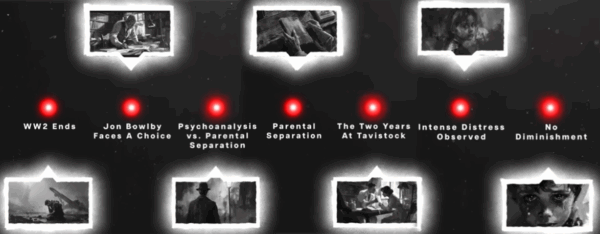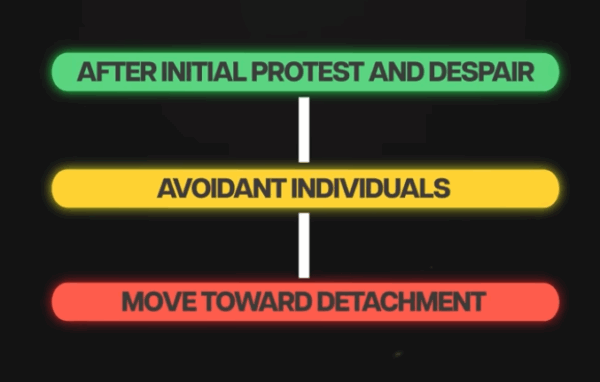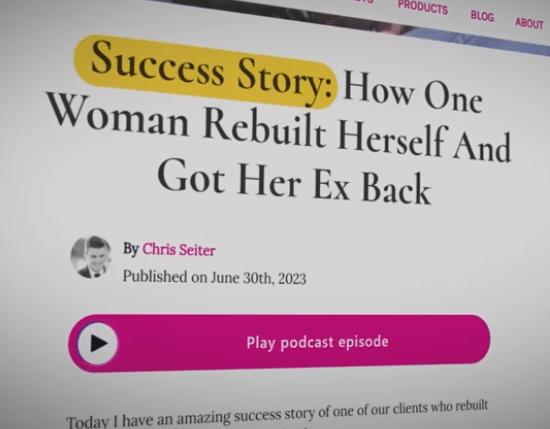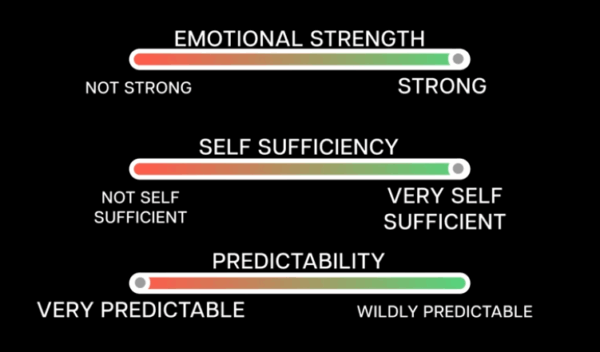Alright, if you want an avoidant to fight for you.
If you want them to stop taking you for granted you need to stop trying to get them back.
One of the best places to glean new information about avoidants is the avoidant attachment subreddit.
And I actually stumbled across a post there by an avoidant who jokingly says they created a “secret formula” that will make an avoidant fall in love.
Now, remember this is totally meant to be a joke to illustrate how pointless and difficult it is to attempt to win them back.
But if you read between the lines there’s actually something brilliant about it.
Alright, so there are FIVE main steps to this formula.
-
Provide Cool Experiences: Be amazing, brilliant, extraordinary, stunning, artistic and be those things all the time. Be better than them in every way. Provide cool experiences that are anything but mundane.
-
Be super unavailable: ideally have a job that lets you be out of the country half of the time, or work 80 hours a week, or have a wide circle of friends that you will not ignore in favor of a date. Being a closeted hermit works good as well. Or a pop star on tour. Or a relationship anarchist with four other partners.
-
Reach Out: Despite being super unavailable, still be the one to reach out, because hey, we’re not going to do it.
-
No Commitments: Don’t have feelings or needs, never ask for anything, don’t DTR, don’t require commitment, for future plans, don’t introduce parents, don’t require compliments or affection. Be 100% drama-free and self-reliant.
-
Understand Their Affection Needs: Magically know what type of affection is okay and desired, and what kind is not okay and repulsive and then do or don’t do those things without getting asked
So clearly this “joke formula” is a playful way of illustrating how absurd and nearly impossible it seems to get an avoidant to fight for a relationship.
Yet, the brilliance lies in what’s subtly hidden beneath the surface of each one of those FIVE main steps.
Let’s dive in once more:
STEP 1: Provide Cool Experiences
- The avoidant values novelty and independence, and deep down, they likely don’t want to feel responsible for another person’s happiness.
- However, when someone brings excitement without creating dependency, it disrupts their expectations.
- The hidden insight here is that avoidants are drawn to people who inspire them but don’t make them feel smothered.
- By being extraordinary without leaning on them, you remain an enigma—something they can’t control or predict.
STEP 2: Be Super Unavailable
- This taps into the concept of scarcity. Avoidants are often comfortable in relationships where they don’t feel overwhelmed by constant presence or emotional demands.
- When you’re super unavailable, it piques their curiosity and sparks the “chase.”
- The hidden insight here is that avoidants start to value what they can’t always have.
- Your absence forces them to confront their feelings because they can’t take you for granted if you’re rarely around.
STEP 3: Reach Out
- This step illustrates the irony of their own behavior.
- Avoidants often don’t initiate, but when you, the unavailable one, do, it throws them off balance.
- The deeper point here is about timing and control.
- Reaching out on your terms signals strength and confidence, challenging their expectations that you’d be the one constantly chasing.
STEP 4: No Commitments
- Avoidants fear being overwhelmed by emotional demands, so a lack of commitment might feel safe and familiar.
- But if you truly embody this, the hidden insight is that they’ll start to wonder if they’re missing out on something deeper.
- Avoidants want connection but fear it—when they see you don’t need commitment, it plays into their fear of losing something valuable, sparking the desire to fight for it.
STEP 5: Understand Their Affection Needs
- This part of the joke highlights how avoidants often expect you to magically know their needs without communicating.
- The key insight here is that by being observant and respecting their space without pushing for more, you subtly build trust.
- When they don’t feel pressured, they may be more likely to fight to maintain the connection.
So what does this all mean?
Well, it means that avoidants tend to fight for people they feel are strong, self-sufficient, and unpredictable, who don’t demand more than they’re willing to give but offer enough intrigue and emotional distance to keep them engaged.
But here’s the thing…..
Pretty much everyone I’ve personally met that wants an avoidant back is not strong, they aren’t self sufficient and quite frankly, they’re wildly predictable.

What Are Your Chances of Getting Your Ex Boyfriend Back?
Take the quizDon’t get me wrong, I’m not trying to upset anyone here. I’m not making fun of anyone. I’m just stating what I’ve observed.
Think of it like this.
You start a relationship feeling completely secure in yourself, confident, emotionally balanced.
But it turns out you’re dating an avoidant and over time, dating that avoidant chips away at your sense of security.
Their constant emotional distance and reluctance to commit start to make you question yourself. You begin to feel anxious, clingy, and insecure—In other words, your once secure attachment style begins to shift toward an anxious one.
Then, out of nowhere, the avoidant leaves, telling you that you are the problem. It feels like gaslighting—you’re left confused, blaming yourself, and wondering how things went wrong.
This is where the real trap begins.
You start chasing, thinking if you can just figure out the right thing to do or say, they’ll come back. But the more you chase, the more distant they become. It’s an endless, vicious cycle because the very damage the avoidant causes makes it impossible for you to be that strong, independent, and unpredictable person they’re drawn to in the first place.
And that’s why when I started this video by saying you need to STOP trying to get an avoidant back, it probably felt like a gut punch. Like it goes against every fiber of your being.
Look, I get it. I’m going to level with you here.
For ten years, I’ve worked almost exclusively with people trying to win their avoidant exes back. I’ve seen the desperation, the endless analysis of every little interaction, the hope that maybe this time, they’ll say or do the magic thing that will bring them back.
I’ve literally watched people crumble in front of me when I tell them they need to let go.
And it’s not because they don’t understand intellectually that letting go is the healthiest thing to do—it’s because emotionally, they’re tied to this impossible idea that if they just hang on a little longer, or say the perfect words, the avoidant will finally realize what they lost.
But here’s the hard truth: trying to win them back keeps you stuck. The longer you chase after an avoidant, the more you become the very thing that drives them away—needy, anxious, predictable. It’s like you’re unknowingly feeding the cycle that’s keeping you trapped.
I’ve seen people break down in tears, not because they don’t know they need to let go, but because they don’t feel like they can. They’ve built their entire emotional reality around the idea of winning this person back, of making things work. It’s become an obsession, and that obsession becomes the very thing that makes an avoidant take you for granted.
The truth is, the second you stop trying—when you truly let go of that need to make them come back—that’s when the real change happens. Not just within you, but within them.
Alright, check this out.
- It’s 1945. World War Two has just ended and Jon Bowlby, the man who is later known as the father of attachment theory, is faced with a choice.
- He has to choose between completing child psychoanalysis training, or researching parental separation’s impact on children.
- He choses to study parental separations’ impact on children, and joins some colleagues at London’s Tavistock Clinic.
- There, he spends two years working alongside a social worker.
- Together, they observe that children experience intense distress when separated from their mothers.
- Even when other caregivers fed these children, it did not the child’s anxiety.
Bowlby identifies three distinct stages of distress that children experience when separated from a parent:
- Protest: Initially, the child reacts with intense distress, crying, screaming, and making desperate attempts to stop the parent from leaving. This stage can last anywhere from several hours to a few days, during which the child remains focused on trying to restore contact with their caregiver.
- Despair: As time passes, the child’s outward protests diminish, and they appear to be calmer, though they are still visibly upset. During this stage, the child tends to reject comfort from others and may withdraw emotionally, showing little interest in their surroundings. Their behavior reflects increasing feelings of hopelessness.
- Detachment: In cases where the separation is prolonged, the child may begin to interact with others again, but in a detached manner. They suppress their emotions and seem to adapt to the absence of their parent. Although they may appear content on the surface, this emotional suppression hides deeper trauma. When the parent returns, the child often shows little reaction, seemingly indifferent to their presence, which can signal long-term psychological harm if this detachment persists.
Alright, so what does any of this mean for an avoidant fighting for you, and not taking you for granted?

What Are Your Chances of Getting Your Ex Boyfriend Back?
Take the quizBowlby’s work on protest-despair-detachment responses to loss highlights how, after an initial period of protest and despair, individuals (especially those with avoidant tendencies) move toward detachment.
We see this in the detachment stage of his research with the children. Yet here’s something that you might not have thought of.
If the detachment is met with a sudden change—like a partner they never believed would truly move on, actually move on—it can sometimes prompt the avoidant to protest or reconsider their previous stance. They may feel a form of separation distress that leads them to want to re-engage, even if they previously acted indifferent.
In other words, it is essential that no matter your goal: If it’s to win them back – Get them to fight for you – Move on – Live happily ever after,
Whatever The Goal: You Need To Pursue Your Own Happiness Without Them
Like I said earlier, avoidants often expect their partner to focus on them or the relationship issues. When you unapologetically pursue your own passions, goals, and happiness, it triggers a shift. They see you thriving without their validation or attention. This creates a sense of scarcity, which can make them fight to not lose you.
Here, I’ll prove it. I’ll play you a clip from a success story interview I conducted last year with a woman named Ashley.
Ashley
- “So, at that point in time, I was pretty secure with where I was. I was like, ‘Okay, you know, if you want this, you’re going to have to show me you want this, because I’m not going to keep chasing you.’ Clearly, that wasn’t working. So, I think it scared him a little bit. He saw that I was going to school, I got a new job, I got a place by myself—I was doing all these things without him, even though we had been inseparable for several years prior. I think that scared him a little. For a few months after that, or actually about a month later, we only met up for dinner or dessert occasionally. We would text each other, but we weren’t slipping back into our old habits of seeing each other every single day or staying the night together.”
Take special note that it’s not until she, in her own words:
- Does well in school.
- Gets a new job
- Gets a place by herself
That her avoidant ex takes notice. That he comes back.
What’s happening here is key: Ashley is no longer seeking validation from him, and this shifts the dynamic entirely.
Instead of being the one who constantly chases or works to keep the relationship going, Ashley focuses on herself, and in doing so, she becomes more attractive in her ex’s eyes. This is where the power of independence comes into play.
Avoidants often distance themselves because they feel overwhelmed or smothered by emotional demands. But when that pressure disappears, and they see their partner thriving without them, it creates a sense of scarcity—suddenly, the avoidant feels like they might be missing out.
This goes back to what Bowlby found in his research on separation and attachment behaviors.
- He identified that during the stages of protest, despair, and detachment, if the detachment is met with a sudden and unexpected change—like seeing a partner you believed would never move on, actually move on—it can trigger the avoidant’s internal attachment system.
It’s this unexpected shift that makes them reassess the situation, often leading to a desire to reconnect, not out of obligation, but because they see the value in someone who doesn’t need them to feel complete.
In Ashley’s case, her ex wasn’t reacting to emotional pleas or desperation. He was reacting to the fact that she was thriving without him. And that’s exactly what flipped the script—she became unpredictable, strong, and self-sufficient, making him realize that if he didn’t act, she wouldn’t be waiting around.

What Are Your Chances of Getting Your Ex Boyfriend Back?
Take the quizThis is a common theme I’ve seen time and again: the moment you stop chasing is the moment they start noticing. By focusing on yourself and your own happiness, you unintentionally create a sense of distance and intrigue that often pulls the avoidant back into your orbit.
Ah, but there’s an irony involved with this.
The great irony is that for many people who desperately try to win their avoidants back, as they walk down the path of moving on and letting go, they often find that they’re no longer interested in getting back together anymore.
By the time they reach that point of true independence and self-fulfillment, the need to be with the avoidant fades away. What once felt like an all-consuming desire to reconcile turns into a realization that they’ve outgrown the emotional chase altogether.
And I’m not sure how to feel about that.
Everyone who clicks on this video likely wants an avoidant back in some way, shape, or form. You’re hoping for the secret to get them to notice you again, to fight for you.
But the only answer I have for you is the one everyone keeps telling you: Move On.
I suppose I’ll leave you with this thought:
Moving on is not about manipulating them into coming back. It’s about freeing yourself.
Because in the end, the most profound transformation isn’t that they finally fight for you—it’s that you discover you no longer need them to.
